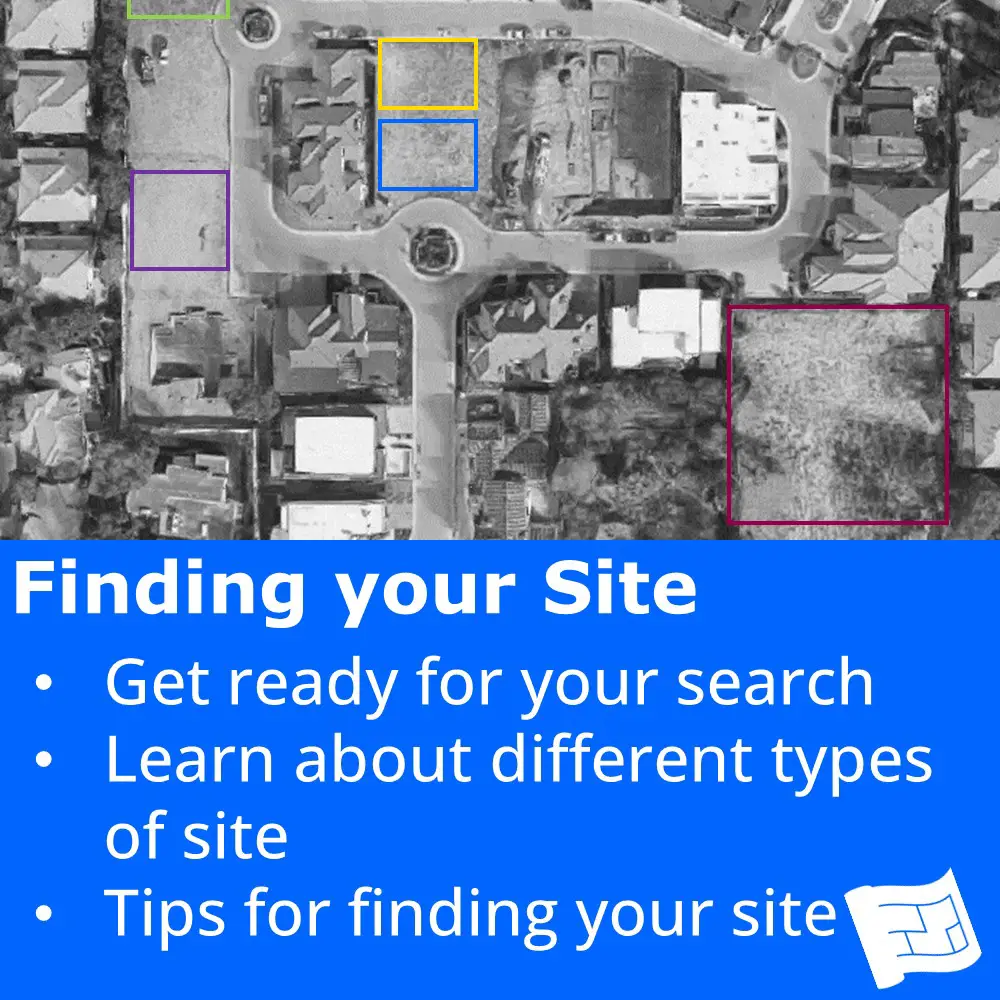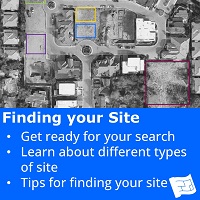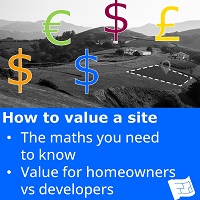- Home
- Your Lot ¦ Plot ¦ Site
- Finding Your Site
Finding Your Site
To make your dream home a reality, you need to have found your site or the home you’re going to renovate.
Some of you will already have found your site / lot / plot, in which case you can move onto the other topics about getting to know your site.
For those of you who need to find a site, let's look into how to go about it.
It's wise to start the search for your site as early as possible in your project.
What do you
need to have in place before finding your site?
Here are 5 (well 4½) things to have in place before starting to search for your site.
1 - Your project goals
If you haven't yet decided on your goals for your project do that now. Part of creating your goals inevitably encompasses thinking about what you want in your new home so keep those goals close to heart when you're finding your site.

What comes first - your design or finding a site?
It's really important to have found your site before your design phase starts, that way your design (or the house plan you buy) can take into account the orientation, local climate conditions, slopes and any other site features or constraints.
You’ll get the best outcome when your home is designed for the site it’s going to be built on.
2 - Your location
First of all, it helps to have decided on the location where you’d like to live. While it helps to be flexible about the location of your site (and there’s nothing stopping you searching far and wide), it’s more efficient to concentrate your search down to the town or suburb that you’re interested in.
You might be looking in an area with lots of options or you may be looking in an area where there’s a shortage of land or suitable houses to renovate. If you’re in this second group finding your site is likely to be a challenging and time-consuming process and the search could take you quite some time.
3 - Learn about site analysis
Before you start finding a site, be sure to learn about how to analyse a site. That way you can make an informed judgement about the sites that are available to you.
In particular make sure you know about site orientation and site zoning.
4 - Budget and Finance
Learn how to value a site so that you can have a think about the maximum that you’re able to spend on your site. For this you’ll need to have spent some time thinking about your budget for your whole project and what portion of that you plan to spend on your site or property to renovate.
Have a plan for how you’ll finance your site so that you can move quickly to secure your site if necessary.
4½ - Get your design professional on board
This is a half because it's a nice to have rather than an essential.
If you’re planning to work with a design professional, it can help to get them on board as you begin your search so that you can benefit from their expertise as you make a decision on which site you’ll buy.
While design professionals won't usually find a site for you as part of their services, getting them on board early to get involved in searching for a site helps build their relationship with you and your project.
Different types of site
At it’s very simplest, there are two types of site:
1. A site that has been built on before
2. A site that has never been built on before
In both cases, CHECK THE ZONING. It’s vital that the site is zoned for the type of property that you want to build.
If the site doesn’t currently have the zoning that would enable you to build your home, but you think it could, have the vendor apply for a change of zoning. Don’t buy the land without the correct zoning. It could be a very expensive mistake. One thing you could consider is offering to put down a refundable deposit to hold a plot while you apply for a change in zoning rules. Make sure you use a real estate lawyer in order to do this.

Services and Utilities
If you’ve got your eye on a site that has never been built on before take some time to check the status of services and utilities. Getting those services in can add a significant cost which you need to account for in your budget.
Tips for finding your site
Sites that are on the open market will cost more by nature of the fact that everyone knows about them. If there is competition for a site, it may be sold at a price that would put the cost of the finished home once it’s been built over the market value.
If you can find your site and buy it in a private sale you’re more likely to strike a deal at market value and save yourself some money.
Here’s a helpful list of proactive tactics and approaches to try. They will take time to execute, and they may not bear fruit for a while, but you’re more likely to be rewarded for your efforts if you put the effort in.
Talk to
people
Who do you need to be talking to to help you in your search to find your site?
- Talk to friends and family if they live in the area you’re looking. Ask them to talk to their families and friends. Do they have any ideas? More specifically, do any of them own a home suitable for renovation or a lot that could be subdivided?
- Talk to real estate agents and land
agents and auctioneers. Just remember
that everyone else is also talking to them. Still – you never know where your opportunity
might come from and at the very least you can learn a lot from agents. Talk to them about the market. Find out how much land is available and
get information on price. How much
competition is there? It's a great way to get a rough idea of what you can afford.
- Talk to local planning officers. Explain that you’re looking for a site for your own home (as opposed to being a developer). However, also ask… Are they planning to release any parcels of land soon? If so, do they know which developer is going to be building on the land.
- Call developers to see if have any land available. Some developers will only sell you land along with a home that they build on it. Others may be amenable to sell you the land for you to build your own home.
- Talk to architects, design professionals and builders and let them know what you're looking for. Besides helping you find your site, this can be a great way to experience working with professionals that you’ll use later on in your project. You can get an idea of what they’d be like to work with and if it suites you, continue your relationship into your design and build phase.
- Talk to locals - try the local church, coffee shop, library, shop owners, bar. You never know what you might find out.
- Are there any social media groups associated with the area in which you’re looking that would be worth reaching out to?
Resources
to check
- Keep your eye on the local press.
- Take a look at online databases (eg Lands of America, Land and Farm, Land Century, Land Watch, Loop Net, Lot Network)
- Try government land listings (Disposal, Real Estate Sales)
Put
yourself forward
- Advertise. How about putting an ad in the local paper, the noticeboard in the school, church, local shop or Craigslist? Be sure to mention the fact that you’re a private buyer looking to create your own forever home. People are much more likely to want to sell to a young family or retired couple than a developer.
- Consider posting a note through any doors of homes that you like and would consider remodeling or tearing down. Although be sure to be tactful depending on the circumstances. Imagine what you’d like to happen to your home if you were the homeowner and tailor your message accordingly.
Detective
work
This is where the magic can happen. It’s where you might be able to find a site that only you know about, which increases your chances hugely.
- Physically drive, walk or cycle around the location that you’re targeting. Keep your eyes open for any possibilities. Don’t be afraid to knock on doors to find out more.
- Look at Google maps. Look carefully for any gaps that might present a possibility. Look in both normal view and satellite view. A tour in street view can be a substitute for physically being in the area yourself.
- If you find a site that you're interested in, you can find out who owns it at a very low cost through services such as US Realty Records.

Keep your eyes open
Here are a few things to keep your eyes open for when inspecting your target area for a site...
- Businesses closing down. Could the business premises be used for a building site or be converted to your dream home?
- Homes that recently have no one living in them. If you watch out for local obituaries or death notices in your area you might get a clue for homes that might need a renovation coming up for sale. The trick here is to tactfully be the first in line and offer the benefit of avoiding real estate agents to the homeowners – all with a high degree of tact of course.
- Could you buy a small chunk of land from several adjoining sites to create a site that’s suitable for your project? These can be hard deals to pull together as it’s easy to imagine how you might be held to ransom on the last parcel of land. Then again if everyone wants to profit from the deal, then the other parties will put pressure on the final person to sell. You’ll have to assess the different motivations at play for each party that’s taking part in the deal.
- Is there a big site available that’s beyond your budget, but could be subdivided? Could you get a loan to buy the whole parcel, then sub-divide, or could you join forces with someone else looking for land. Check with a real estate lawyer about the possibility of dividing the land up as far as deeds are concerned.
- If the information held by your planning department is public information take a really close look. Can you find anywhere where approval has been granted for a building project where the house was never built and yet the site never came up for sale? This means there’s an owner of land with permission to build who might be amenable to selling. And no-one else will know about it.
- Are there any large land owners that you could contact. For example, universities own lots of land. It might be on a campus, or buildings in town depending on where the university is situated. You never know when they might be shaping up to sell some of their land or buildings.

You never know where you might find your site
When we were looking to buy a home to renovate we lived opposite a park which had a park keepers cottage. We could see that no-one was living there and the house was starting to look a bit worse for wear.
I approached the council about buying it. I was turned down flat, but a month later, a builder turned up and did some repairs to put the house in order. So at least we had a nicer house to look at opposite us.
While on this occasion it didn’t turn up a site for us, it might have!
Be flexible
Some degree of compromise may be necessary to find your site. Let me say that another way. I’m not saying that you should compromise on your requirements rather to cooperate with the sites that are presented to you and see how they could fulfill your requirements, even thought it might not be exactly as you had envisaged.
- Don’t forget to consider knock down and rebuild opportunities.
- Don’t overlook small or unusually shaped sites. These sites will be less expensive and you can use clever design to overcome the challenges of unusual sites.
- Be open to possibilities – tell people that you want to build a home in the area and give them a rough idea of size or budget and leave it at that. It’s better to be told about everything and be given a chance to think about the possibilities than to miss out on something.
Be ready to
buy
Lastly, be ready to buy. Get your finances in order so that you can act quickly when your find your site.

Missing out
Being ready to buy isn't all about the finances. It's also about being decisive and knowing when find the site that's right for you and then acting quickly.
It may take missing out on one site opportunity to galvanize you into acting quickly on the next suitable site that you see.
So if you do miss out, remember that it's not an uncommon experience, and that the experience will equip you well to make a timely decision on future opportunities.
Acting quickly is all very well but...
Before you sign on the dotted line to buy your site / property make
sure that you have all the information you need to make that decision.
In particular...
- Check with your area's planning
department for the rules (eg planning, zoning, heritage) that apply to
the lot you're planning to buy.
- Get a soil condition report done as part of the transaction if soil conditions could be a concern for foundations.
- Get a full survey done on the current property as part of the transaction.
Best of luck for your site search
Don’t forget to start your search early and remember that persistence is key. Don’t just leave your details and leave it at that. Contact people regularly. It’s all about building up a relationship so that you’ll be the first person on their mind when a site that’s suitable for you comes up.
Keep records of your search and commit to trying out each of the searching tips at regular intervals.
Keep talking to people, checking the online resources regularly, go back to owners who’s site or property you’d like to purchase. Things can change over time so just because you hit a dead-end last time, this time you might get lucky.
Being flexible about some of the criteria of your site and dedicating enough time and energy to your search is fundamental to snapping up the site or property for your home project.





